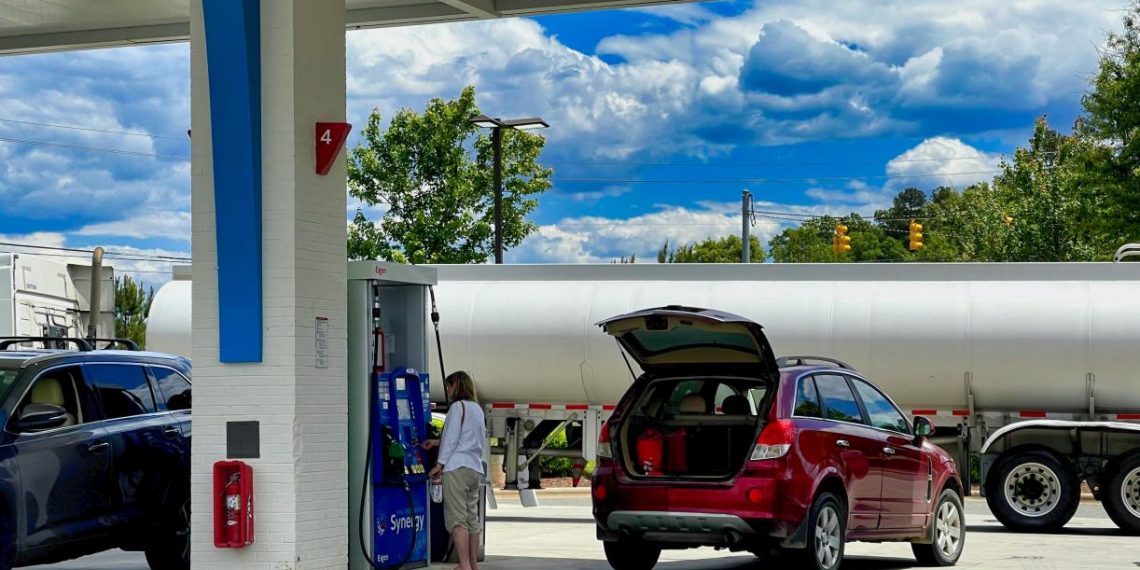As oil and gas prices worldwide continue to surge following Russia’s invasion of Ukraine, the dangers of relying on fossil fuels are clearer than ever. The United States announced a ban on Russian oil and methane gas imports on March 8, 2022, expanding the economic sanctions imposed on Russia in response to the invasion. U.S. gasoline prices peaked on March 11, 2022 at $4.33 per gallon and continue to hover above $4.20 per gallon, more than $1 per gallon above prices a year ago, according to AAA.
Countries that rely more heavily on imports of Russian oil and methane gas have been reluctant to extend sanctions to Russia’s energy sector for fear of the impacts on their own citizens and the global economy, given that Russia is the world’s largest oil exporter. But additional sanctions are announced on nearly a daily basis as the war goes on.
Some members of Congress have proposed ramping up oil and methane gas production at home to protect U.S. energy security and keep costs affordable for consumers. But that logic is fundamentally flawed. It is impossible to significantly increase fossil fuel production in the short run, and we can only remove Russian President Vladimir Putin’s ability to use energy as a weapon by ending our dependence on oil and methane gas once and for all, as former Secretary of the Navy Ray Mabus recently testified before the Senate Environment and Public Works Committee. There are steps we can take right now to accelerate that transition here in the United States while easing the energy cost burden on consumers — and avoid locking in more emissions and the dangerous climate change impacts they would bring.
Calls to boost America’s energy independence by expanding domestic fossil fuel production reveal a common misunderstanding about what causes price fluctuations in the global oil market. The United States produces about as much energy as it consumes, and domestic oil production is at near-record levels. However, because oil is a global commodity, U.S. gasoline consumers will always be hit hard when the global price of oil spikes, as it did to over $100 per barrel in recent days. This would be true even if the United States didn’t buy a drop of Russian oil and it were 100% energy “independent.”
Other proposed solutions, such as suspending the federal gasoline tax and simply asking oil companies not to raise their prices won’t work, and in the long run, these proposals would just perpetuate an inherently volatile industry and prop up the fossil fuel companies that are responsible for the climate crisis.
So, what can we do to relieve consumers’ pain at the pump, boost our energy security and avoid a dangerous future for our children? Here are three things:
1) Make smart investments now to accelerate our transition to a clean energy economy.
We need to double or even triple the rate at which we are installing new wind turbines and solar arrays. These are also our cheapest sources of energy, so replacing fossil fuels with these clean energy sources will save consumers money and create jobs at the same time as it increases our energy security and reduces pollution.
We also need to invest in upgrading our transmission and distribution system. We need a portfolio of storage and dispatchable clean generation options to build a 100% clean, reliable and affordable electricity system.
2) Expand electric vehicle (EV) tax credits.
This won’t just benefit new EV owners, but rather drive down gasoline prices for all. Even modest reductions in oil demand as EVs gain market share will put downward pressure on gasoline prices. At the same time, as long as utilities provide appropriate incentives for EV drivers to charge their cars at times when the grid is not under stress, increased sales of electricity for EVs actually helps reduce electricity prices because the fixed costs of the electricity system will be spread out across more kilowatt-hours.
3) Congress can provide immediate relief to American families.
Suspending bus and transit fares and providing an expanded earned income tax credit, childcare tax credit and/or direct relief checks of about $100 per month for each household (which is roughly equal to the increase in gasoline costs for the average family, comparing current prices to those in January 2021), would provide immediate relief to U.S. families. This could be paid for by imposing an excess profits tax on oil companies, as the United States did during World War II. The recent success of the COVID-19 stimulus checks the federal government sent to millions of Americans illustrate the benefits of measures like this, which help give families maximum choice about how to manage their budgets.
Securing a Safe Future for Us All
Whenever a major fossil fuel producer is involved in a war, or global energy markets are disrupted in other ways, the impact of energy price spikes on families and the economy are a significant concern. Instead of choosing responses that will perpetuate this problem, let’s instead invest in real solutions that bring massive economic benefits for Americans, improve U.S. energy security by reducing our dependence on volatile global oil markets, and reduce emissions to help prevent the most dangerous impacts of climate change.
A version of this article originally appeared in The Hill.



